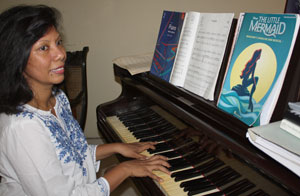When she isn’t taking part in big-budget operas in New Delhi, pianist and soprano Menaka de Fonseka Sahabandu has for the past 26 years been teaching the cream of Colombo’s musical youth from her drawing room. From her precocious student body she has formed the Menaka Singers, who are to perform a song cycle, September Song, in Colombo’s Lionel Wendt Theatre on September 3, 4, and 5 at 7.30 p.m., in aid of rehabilitation and vocational training of youth in the North.
Featuring various staples of Western classical opera, including Mozart’s Marriage of Figaro, alongside the work of Sri Lankan composer Dinesh Subasinghe and songs by John Lennon and from the American musical Carousel, September Song will feature both Menaka’s junior and senior choir – the former composed of children aged 6 to 12 and the latter aged mostly up to 25, with a few notable older exceptions. For Menaka, it is the summation of her work as a teacher; for her pupils, it is a high profile opportunity to further their musical careers.
 |
| Menaka: A career
peppered with plaudits.
Pic by Nilan Maligaspe |
Many have already taken ambitious steps, with one of the young men of her senior choir having completed a musical scholarship at England’s Cambridge University, singing in the world famous Kings College choir.
The Menaka Singers have in the past few years taken part in some of South Asia’s most elaborate operatic productions. In January this year, New Delhi’s Siri Fort staged French composer Adolphe Adam’s 19th century comic opera If I Were King.
Set in Goa in 1510, it is the story of a young fisherman called Zephoris who is made king for a day by the monarch of Goa, and goes on to foil a court plot to facilitate a Portuguese invasion, thereby winning the hand of Princess Nemea, a cousin of the rightful king. It was undertaken in the spirit of a Bollywood movie – the French Director, Jean Francois Vinciguerra, being greatly influenced by Indian film – with sequinned costumes, frenetic dance routines and large helpings of melodrama.
Another French opera with a South Asian setting, George Bizet’s The Pearl Fishers, a tragic tale of forbidden love set in Sri Lanka (or what was then Ceylon), was performed to great acclaim in Colombo in January 2008 – a highly cosmopolitan Sri Lankan-Indo-French production that featured the Symphony Orchestra of Sri Lanka, French conductor Benjamin Levy, Indian singers such as baritone Vikrant Subramaniam, and Menaka de Fonseka herself as conductor of the choir, which included her Menaka Singers.
Music has always been the substance of Menaka’s life. Her mother played the piano and her grandfather manned the organ at their local church, but it was Menaka’s early appreciation of Western classical music, carefully cultivated by her mother who took her to every notable performance in Colombo and frequently played opera in the family home, which guaranteed her life-long passion.
Menaka’s musical career has been peppered with plaudits. In 2002 she received the award for excellence in vocal western music by the SAARC Women’s Association of Sri Lanka, and before that was gifted Sri Lanka’s Savasangeetha award, a grant for further study. She has played as a pianist and sung as a soloist for the Symphony Orchestra of Sri Lanka, performing works such as Handel’s Messiah and Saint Saens’ Christmas Oratorio, alongside assuming starring roles in operas staged in New Delhi such as Frazquita in George Bizet’s Carmen in 2008. Such is her commitment that, in 2002, she agreed to perform at the 125th anniversary of Trinity College London just three weeks after she had had her first child – for which she had to begin practising 10 days after the birth.
Menaka’s first pupils were made up of friends and relatives, but word spread and she soon found herself teaching every day. Demand only grew and her drawing room, furnished with a handsome piano, was transformed into a classroom, which has kept up service ably ever since.
Sri Lanka has enjoyed a long-term partnership with British institutions such as Trinity College London and the Royal College of Music, who continue to deploy representatives in Colombo, and examine and award certificates to Sri Lankans seeking formal qualifications in Western classical music.
Menaka prepares her students for these British examinations, which she herself underwent as an aspiring singer and pianist. It is over such stepping stones that careers in classical music must still be made in Sri Lanka, but as its audience and profile grows in the island – through performances such as September Song, no less – it is not inconceivable that Sri Lanka may one day forge an institutional framework of its own, with standards every bit as exacting as those in the West. The talent certainly exists, as does the energy. All they require are eager listeners.
|


